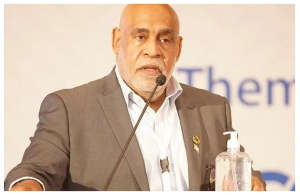The United Nations (UN) Resident Coordinator for Ghana, Charles Abani, has underscored addressing illegal mining or galamsey as crucial to establishing a sustainable economy.
Outlining implications of illegal mining to the country’s economy, he said it has significant devasting impacts on people, poverty, jobs, child-labour, the environment and water – and also drives illicit financial flows.
Delivering his keynote address at the Institute of Sustainability Professionals Ghana (ISPG) launch, he said a study by the UN estimates that the minimum illicit financial flows impact in the region is US$3billion a year.
“Per our estimate in the UN, based on proxy figures from other countries in the sub-region where we have done this study, it showed that the minimum Illicit Financial Flows (IFFs) impact in the region is US$3billion a year,” he said.
“That is the size of money you borrowed from the IMF for three years to survive. So, if you address galamsey you will have a sustainable economy,” he added, stressing that the ambition of attaining a sustainable economy is “locked in the cupboard by galamsey and can be unlocked if we change the narrative”.
To corroborate the UN statistics, a study by the Africa Centre for Energy Policy (ACEP) on IFFs and the extractive industry in Ghana stated that in 2013 IFFS from illegal mining alone cost the country US$1.7billion.
He urged citizens to keep up with the conversation on illegal and unregulated mining, because it is a catalytic issue that can transform the economy and lead to a sustainable country.
The ISPG is dedicated to advancing sustainability practices and fostering professional development in Environmental, Social and Governance considerations and standards in Ghana.
It aims to be a hub for knowledge-exchange, capacity building and strategic collaboration, providing a platform for professionals and organisations to develop a comprehensive sustainability framework.
Focusing on the institute and its contributions, he welcomed the idea – stating that it presents a great opportunity for the country to view sustainability from a holistic perspective by looking at how it can be infused in every activity embarked on.
He further urged stakeholders, business leaders, professionals, policymakers and young innovators to engage actively with ISPG’s initiatives, so that collectively “they can drive sustainable development, not just for Ghana but as part of a global movement toward a greener, fairer future”.
President-ISPG, Professor Mathew Tsamenyi, noted that the institute aims to create a single platform for conversations on sustainability, ensure standardisation and empower companies and SMEs to embrace sustainability for business growth and preserve the environment for future generations.
He added that for banks to offer financial support to clients and drive the sustainability agenda, customers must understand the concept of sustainability; therefore, the institute will organise masterclasses for participants and embark on outreaches at tertiary and secondary institutions to educate them on sustainability issues.
For her part, Programmes Officer-ISFG Majorie Quansah said concerning the impact of climate change in every sector, sustainability has become “everyone’s business” – hence, she called on institutions and individuals to join the institute and broaden their knowledge base on the subject at hand.
To ensure that the institute’s goal is attained, “the long-term plan is to have it chartered in parliament and have it entrenched in the laws” she said, adding: “We are focused and determined to drive sustainability in this country”.
Watch the latest edition of BizTech below:
Ghana’s leading digital news platform, GhanaWeb, in conjunction with the Korle-Bu Teaching Hospital, is embarking on an aggressive campaign which is geared towards ensuring that parliament passes comprehensive legislation to guide organ harvesting, organ donation, and organ transplantation in the country.
Click here to follow the GhanaWeb Business WhatsApp channel
Business News of Monday, 21 October 2024
Source: thebftonline.com













